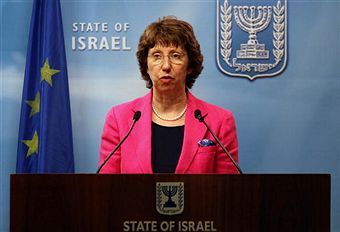 After months of behind-the-scenes work, the shape of the European External Action
Service – the EU’s diplomatic corps – is now coming into view. The Bruxelles2 blog has obtained a version of its structure with some of the key names penciled in. You can find it here.
After months of behind-the-scenes work, the shape of the European External Action
Service – the EU’s diplomatic corps – is now coming into view. The Bruxelles2 blog has obtained a version of its structure with some of the key names penciled in. You can find it here.
The top three jobs in the EU’s diplomatic headquarters will go to a Frenchman, a Pole and a German. The only senior UK official, besides Catherine Ashton (and her personal aides) is
long-serving diplomat and geo-strategist Robert Cooper. But his name, rather mysteriously, is followed by a question mark.
Of the EU “ambassadors” that have been appointed until now, there is one one Brit, ex-Ambassador Ros Marsden, who is now the EU envoy in Sudan. German Markus Ederer, a top foreign ministry official in Germany, is to take up the EU’s Beijing post, while Austria’s current ambassador to the EU, Hans Dietmar Schweisgut, will go to Japan. They will be joined by five Spaniards, three Frenchmen, three Irish, two Italians and two diplomats from the Netherlands. A second German official was named EU ambassador to Papua New Guinea; two Belgians will represent the EU in Burundi and Senegal; and two officials from Luxembourg will take up diplomatic posts in Singapore and Haiti. Denmark has secured one post, in Macedonia. Of the newer member-states, Poles will go to South Korea and Jordan, and Bulgaria will represent the EU in Georgia.
Four posts are being re-advertised, including the EU ambassadors to Brazil and Iraq, the deputy ambassador in the United States and the EU ambassador to Bosnia and Herzegovina – a post the Foreign Office has had an eye on before.
Insiders tell me there are a couple of reasons for the dearth of British candidates. First, Lady Ashton has been sensitive to charges of British bias – many people in her private office are Brits – so has probably felt it wise to delay the appointment of Britons. But there are other reasons too. Despite William Hague’s encouragement, few top-quality British diplomats are interested in working for the EEAS. Those that do, have applied for EU jobs as well as UK postings. The FCO’s recruitment system works faster than the EU’s, so applicants pull out of the EEAS competition when they are offered UK jobs. Those that stay in the competition have until now not been deemed qualified. In a speech earlier in the year, the Foreign Secretary said Britain represents just 1.8 percent of the staff at entry-level grades in the EU bureaucracy while the number of British officials at director level in the EU’s executive had fallen by a third since 2007. On current form, this does not look like it is changing.






Comments